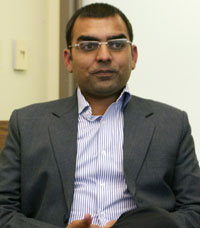On September 4, 2010, Pakistani journalist Umar Cheema was abducted as he was going home after a dinner with friends near Islamabad. He was held captive for more than six hours, during which he was tortured by masked individuals. He was told to stop criticizing the government in the articles he wrote for the English-language daily The News and was dumped the next day by his car. (CPJ has covered his case extensively.)
Seven months after his ordeal, Cheema traveled to the United States and stopped by Columbia University’s Graduate School of Journalism to talk to students about the dangers of reporting in his country.
“In order to be safe and secure in Pakistan, one needs to be on the government’s side,” he said before describing his abduction. Cheema then told of being undressed and whipped, shaved, and photographed in humiliating poses. “The torture was physical and also psychological,” he said. “They told me if I get picked up again, I will face worse than this.”
But Cheema said he decided to speak out against the attacks as soon as he was released. “Ten minutes after I was free, I started thinking about what I should do: The decision was I had to speak up,” he said. “It has made me stronger and made my enemies more cowardly. Their efforts to intimidate me backfired.”
Authorities appear to have begun an investigation in Pakistan partly because of the strong media coverage of the case, but, to this day, no one has been arrested in connection with the attack. Cheema blames it on the lack of government will. “They are doing nothing,” he said. “They do not want to arrest the culprits.”
CPJ’s annual report identified Pakistan as the world’s deadliest country for the press in 2010. The country ranks 10th for impunity for the killers of journalists, according to CPJ’s Impunity Index, “Getting Away with Murder.” The index calculates the number of unsolved journalist murders as a percentage of each country’s population.
Cheema said he was harassed and chased a few times since September, but he decided not to publicize these attacks as much because “it could become a joke.” He also said that he still doesn’t feel secure in Pakistan. “I live in a self-imposed house arrest,” he said, adding he now goes to his office accompanied by a friend.
“I have to be more careful,” he said. “I don’t go where I can be in danger. If I’m going to meet someone who might not be a credible source, I take a friend with me,” he said. Two high-profile employees of the Jang media group (which owns The News) were forced to leave the country because of constant death threats, he said.
Cheema’s popularity, in addition to his traumatizing experience, has changed his reporting. “Now I have to produce more reliable stuff than I was doing before because everybody notices much more what I write,” he said. But Cheema said he was proud of breaking the silence. “The fight I have been through is for the whole journalism community,” he said. “Had I remained silent, I won’t have forgiven myself ever. It is a better option, though I have put myself at risk. But it won’t last long until I feel free again.”
UPDATED: The article has been corrected to reflect that Pakistan is 10th on CPJ’s 2010 Impunity Index, not third.
